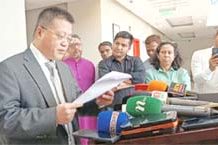C T Online Desk: Information Adviser Md Nahid Islam has that the Ministry of Law has been instructed not to take action or arrest anyone in cases currently filed under the Cyber Security Act (CSA).
He said this while discussing the cases that have been filed under the law in recent months of the interim government’s tenure.
There have been several cases filed under the CSA, including some involving allegations of defamatory remarks on social media about Chief Adviser Dr Muhammad Yunus, Information Adviser Nahid Islam, and Army Chief of Staff General Waker-uz-Zaman.
In response to inquiries, Nahid Islam said: “We have already said that we will either repeal or amend laws that are repressive and obstruct freedom of speech and press. These laws are currently under review. We have advised the Ministry of Law not to take action on the cases that are being filed and not to arrest anyone while the law is under review.”
When asked about the plaintiffs of the cases, he replied: “We do not know who these people are. We are discouraging such actions. One of these cases was filed over allegations of religious defamation, and our names have been associated with the case. We need to look into whether these cases are being filed to embarrass us.”
Death threats against Dr Yunus
On September 26, a case was filed against Md Masum Billah, 40, in a Patuakhali court for making negative remarks and death threats against Chief Adviser Dr Muhammad Yunus.
Hasan Mahmud filed the case, alleging that Masum Billah, a pointsman at Kamalapur railway station, made defamatory remarks about Dr Yunus on social media, referring to him as “an American agent.”
The plaintiff claimed to have been deeply hurt by the comments. The case also mentioned that Masum Billah called Dr Yunus derogatory names, including “usurer,” “Jew,” and “Western agent,” and threatened to shoot him if found alone.
The police have yet to arrest the accused.
Case filed for religious defamation
On September 24, a case was filed under the CSA against Moktar Hossain from Fatikchhari upazila, Chittagong, for making defamatory remarks about Chief Adviser Dr Muhammad Yunus, Information Adviser Nahid Islam, and the army chief.
The case, filed by Mohammad Saifuddin, also alleges religious defamation.
The Cyber Tribunal in Chittagong has accepted the case and directed the Criminal Investigation Department (CID) to submit an investigation report by November 27.
Cyber cases during Hasina’s tenure
The Center for Governance Studies (CGS) reported that between October 2018 and September 2023, a total of 1,036 cases were filed under the Digital Security Act (DSA), which later became the CSA.
These cases involved 4,520 individuals, with 1,543 identified by profession.
Among the defendants, political leaders (495) and journalists (451) were the largest groups.
Government employees, doctors, NGO workers, lawyers, students, and teachers were also among those accused.
A total of 1,549 individuals have been arrested, including 143 political leaders, 104 students, and 97 journalists.
The plaintiffs in these cases are primarily members of the Rapid Action Battalion (RAB), police, government officials, and political leaders.
Leaders of the ousted Awami League were responsible for filing the majority of the cases (334).
Most of the defendants in these cases were opposition leaders and activists.
Despite the relatively low conviction rate, defendants often remain in jail and face harassment.
Notably, writer Mushtaq Ahmed, a defendant in one of these cases, died in custody on February 26, 2021.
According to Article 19, in 2021 alone, 40% of DSA cases in Bangladesh were related to critical remarks about the prime minister, ministers, or ruling party leaders.
‘Cases still being filed under CSA disappointing’
Former President of the Bangladesh Students’ Union, Sharifuzzaman, expressed disappointment that cases are still being filed under the CSA, despite freedom of speech and press being key demands of the July uprising.
He said: “Many people have been prosecuted and tortured for speaking out under this law. Cases have been filed against those who spoke out against the regime.”
He further emphasized that this law should be repealed immediately to align with the people’s expectations for change.
Sakib Anwar, organizing secretary of Nagorik Oikya, labeled the law as “entirely repressive.”
He said: “The previous government used this law to silence dissent and protect its corruption. Writer Mushtaq Ahmed was killed while in remand under this law. How can such a law still exist?”
He concluded by urging the current government, which came to power through a popular uprising, to repeal the law and cease filing cases or making arrests under it.
Human rights activist Nur Khan questioned how cases are still being filed under the repressive laws of Sheikh Hasina’s government.
He suggested that those who file such cases should now be prosecuted instead.
Supreme Court lawyer Manzil Morshed said: “A law is necessary to combat cybercrime, but this one is being misused. From the beginning, we opposed it, and its misuse continues.”
He recommended that the government could issue administrative orders to prevent further cases and misuse of the law before it is repealed or amended.














